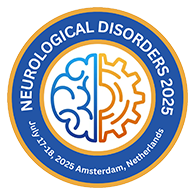Call for Abstract
Scientific Program
31st Annual Summit on Neuroscience & Neurological Disorders, will be organized around the theme “Theme: Unlocking the Brain’s Potential: Redefining Neurological Care Through Innovation”
Neurological Disorders 2025 is comprised of keynote and speakers sessions on latest cutting edge research designed to offer comprehensive global discussions that address current issues in Neurological Disorders 2025
Submit your abstract to any of the mentioned tracks.
Register now for the conference by choosing an appropriate package suitable to you.

